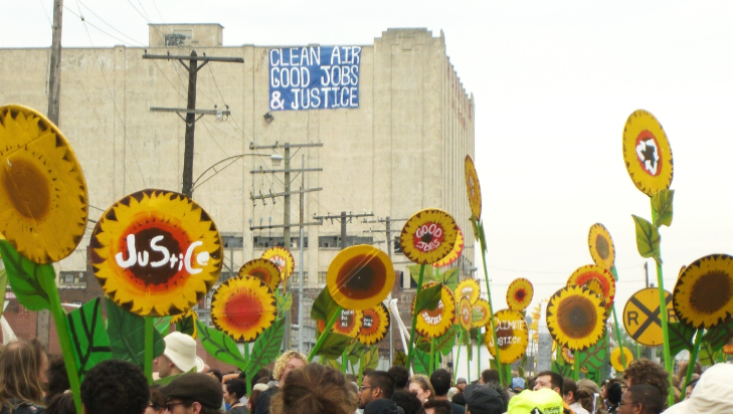"Just Ecologies" talk series (2023/24)
20. Oktober 2023, von E. Çaylı

Foto: Marcus Johnstone
"Just Ecologies" is a new series of talks that focuses the politics of ecology on systemic injustices and the struggles for justice they have been met with.
17:30-19:15 | Hörsaal 22/23, Bundesstraße 53, 20146 Hamburg | All welcome; first come first served.
Organizer: Prof. Dr. Eray Çaylı (with Dr. Adnan Mirhanoğlu) from the Institute of Geography & the "Violence and Security" profile initiative.
31 January 2024 (Wednesday)
Threatening Dystopias: Development, Adaptation, and Climate Justice
Dr. Kasia Paprocki, London School of Economics and Political Science
In the global imaginary of climate change, Bangladesh holds a prominent position. Frequently described as the "world’s most vulnerable country to climate change," the spectre of Bangladesh underwater, wiped off the map by rising seas, has given birth to a crisis narrative that obscures how interventions in the environment and social life of the country have already transformed the landscape many times over. Today, development in Bangladesh is increasingly defined by and through an adaptation regime, which governs the landscape of possible intervention in anticipation of climate change. It is built on a vision of development in which urbanisation and export-led growth are both desirable and inevitable. For the rural poor, this entails dispossession from agrarian livelihoods and outmigration. As this shift contributes to the expansion of production of export commodities such as garments and frozen shrimp, the threat of climate change and its associated migrations is reframed as an opportunity for development and growth. This presentation will draw on over two years of multi-sited ethnographic fieldwork to explore how this adaptation regime is produced, experienced, and contested by a variety of actors from rural Bangladesh, to Dhaka, the Bangladeshi capital, to global institutions of development and knowledge production.
Questions: anna.wagner@uni-hamburg.de
PAST EVENTS
8 November 2023 (Wednesday)
The Academic Climate
Prof. Dr. Ghassan Hage, University of Melbourne & Max Planck Institute for Social Anthropology
In this presentation I want to reflect on an old question which seems to be absent from the academic debate on the Anthropocene. To what extent is the academic discourse on climate change specific to academic culture? While it is clear that "climate change affects and concerns everyone," to what extent can academics contribute to a politics of climate change without universalizing the particular "academic climate" and its particular social and affective relation to climate change, without reflecting on the inevitable "projecting one's relation to the object into the object?"
30 November 2023 (Thursday)
The Geography of Chemicals: From Colonialism to a Just Ecology?
Prof. Dr. Andrew Barry, University College London
Colonial prospectors, mining companies, and scientists, were long concerned with the uneven geographical distribution of mineral deposits. Indeed, the British chemist William Jackson Pope once advocated the need for a field of chemical geography, which would map the planet’s natural chemical resources for the benefit of empire. In this talk I turn from the colonial geography of natural chemical resources to consider the uneven geography of industrial chemicals and their by-products, the toxicity of which became increasingly apparent in the late twentieth century. If chemical geography was once proposed as a colonial field that should focus on the uneven geography of resources, what form of chemical geography would be attuned to the uneven geography of toxicity, and the questions of ecological justice that follow?
6 December 2023 (Wednesday)
Infrastructural Inequities and Democratic (Counter) Currents
Prof. Dr. Leila Harris, University of British Columbia
This talk explores narratives and lived experiences of the uneven implementation of the human right to water, highlighting the ways that water and sanitation infrastructures become entangled in broader social and political relationships. Specifically, the work explores uneven and unreliable infrastructures as central features of lived experiences of injustice. Exploring infrastructure in this way, it becomes clear that water and sanitation are not simply basic needs, but are fundamentally linked to broader social, political and affective processes and experiences. The talk explores these broader dimensions through consideration of political subjectivity and engagement, state-society relations and senses of trust and government legitimacy, as well as broader aspects of social, political and affective lives.
17 January 2024 (Wednesday)
Infrastructure-led development, urban transformation and inequality in the New Silk Road
Dr. Elia Apostolopoulou, Autonomous University of Barcelona & University of Cambridge
In this talk, we will discuss the links between infrastructure‐led development, urban transformation and inequality in China’s Belt and Road Initiative (BRI). By drawing on postcolonial geographies, my goal is to offer a relational analysis of divergent trajectories of socio‐spatial urban change driven by BRI projects across the Global South and North. My key argument is that urban transformation driven by the BRI signals the emergence of a new form of infrastructure‐led urbanization. This engenders both new urban formations and new urban politics that, despite variegated expressions across different contexts, are reconfiguring urban space and are transforming the social geography of each city by creating, facilitating or exacerbating social, environmental, and spatial inequality.
